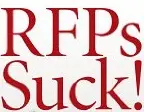The simple answer is no, don’t do it. Ok, let me explain.
Background: Where is this whole idea even coming from in the SaaS law or software law regime? Many customers are counseled or taught (BTW, there are lots of companies teaching your customers how to negotiate and buy from you) to send out long RFPs that ask for the world (lots of detailed questions about your solution . . . more information than they probably need), and then when it comes to the contract stage they too often demand that your whole RFP response should become part of the final contract. Well, I think that is a really bad idea, and here are 3 reasons why.
1) RFP Responses = Marketing Material. These responses were not written or intended to be inserted into contracts. If you really think about it, when you wrote the response you had your marketing hat on; you were telling them how great your product was. But were you thinking you were writing the contract? Probably not. Marketing material has a purpose, and that purpose is not contractual (it is more about education and inspiration).
2) Contracts = Rights, Duties, Etc. ≠Marketing Material. If you said in your RFP response that “…this software is the best software that does x…” should that become part of the contract? Absolutely not. Have you ever heard of the legal term ‘puffery‘? Well it is a legal term that describes those vague and optimistic terms that should not be legally actionable, and should not be relied on (i.e. they are general marketing terms and not contractual terms). So, if these type of words from your RFP response become part of the contract, then I think you are begging for a lawsuit.
3) Good Luck Trying to Book the Revenue. Most of the accounting rules around revenue recognition look for consistency and predictability, and if you start including all these different and varied RFP responses in your contracts, then I think you are probably killing that consistency and predictability. Are you selling a custom solution or a general solution that everyone really gets the same thing? If it is the former then I understand the request to address some of the RFP responses in the contract (re-written in another form), but most SaaS companies (at least most of the ones I have worked with) are providing the latter . . . a general solution in which everyone gets the same thing.
So long story short, try super hard not to include your RFP response into your customer contract, as 1) that was not the purpose you wrote it for, and 2) you are probably looking at some revenue recognition problems if you do (i.e. not a good thing). Think about this folks, as this is coming up more and more, and quite frankly I think it is somewhat of an RFP trick (that I don’t want you to fall for). This is SaaS Law you need to be aware of.
Resources
Disclaimer: This post is for informational and educational purposes only, and is not legal advice. You should hire an attorney if you need legal advice, which should be provided only after review of all relevant facts and applicable law.

